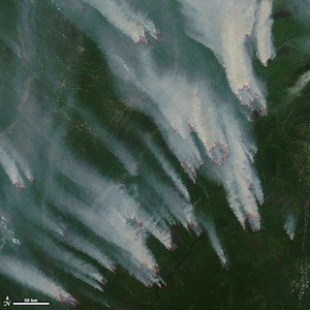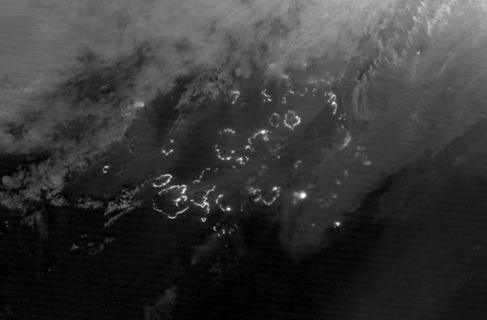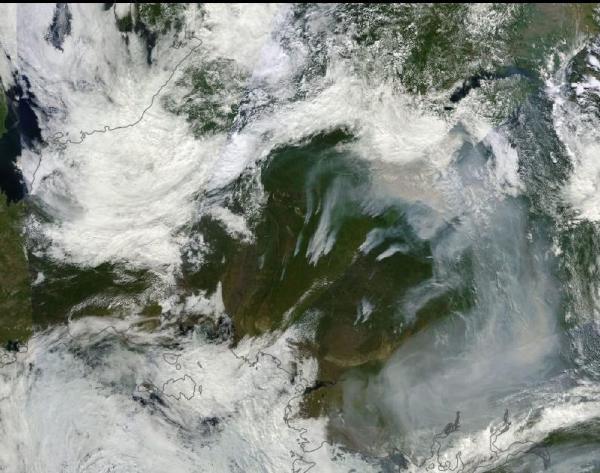I fell into a burning ring of fire
-Johnny Cash
The wheat fields waving
The dust clouds rolling
-Woody Guthrie
Greetings
Here's a nice article that ties together the Russian petro state, the Siberian fires of 2012 (amazing photos from NASA); with the wheat fields of Ukraine. He describes Putin's death spiral - more oil leads to more burning wheat fields, requiring land grabs, fueled by oil profits, requiring more oil etc....
Then there is the Exxon connection. Exxon and Rosneft have entered into a $500 billion partnership . And what about sanctions? Here's a quote from Business Week: Perhaps the US has its own oligarchs...
As the U.S. and European Union ratchet up sanctions against Russia, it’s hard to see Chevron and Exxon being receptive to whatever pressure they may get from Washington to pull back from their newfound Russian comrades. After all, these companies may be headquartered in the U.S., but they derive much of their profits from operations overseas. Their fidelity is to their shareholders, not necessarily their government. In an infamous quote included in Steve Coll’s book on Exxon, Private Empire, former CEO Lee Raymond once said, “I’m not a U.S. company, and I don’t make decisions based on what’s good for the U.S.”"
------
from Robertscribbler
The Monsters of Growth Shock Rise: Conflict in the Ukraine, Global Food Crisis, and Spending 500 Billion Dollars to Permanently Wreck the World’s Climate
(Immense Russian wildfires burning through the thawing tundra’s carbon pool during summer of 2012. The bar on the lower left denotes 50 kilometers. From end to end, the burning zone seen is about 500 miles in length. Image credit: NASA. Image source: Smoke From Massive Siberian Fires Seen in Canada.)
The radio and television today blares with the news but never the causes:
US meat, coffee, almond and milk prices to sky-rocket. Ukraine invaded by the Russian petro-state. Exxon Mobile to partner with Russian Rosneft and invest 500 billion dollars in extracting oil and gas from the increasingly ice-free Arctic.
What has caused all this? In a term — Growth Shock.
What is Growth Shock?
It’s what happens when any system grows outside of the boundaries of its sustainable limits. In the current, human case, its primary elements are overpopulation, renewable and nonrenewable resource depletion, climate change, poisoning the biosphere and wasting livable habitats, and a vicious system of inequality in which an amoral elite loots and pillages the lion’s share of planetary resources while driving increasing numbers of persons into poverty, hunger, and vulnerability to environmental/ecological collapse.
In the more immediate sense, human burning of fossil fuels is now intensifying droughts and extreme weather around the world. This is negatively impacting agricultural production. In addition, military aggression on the part of Russia has destabilized one of the world’s largest food producers — Ukraine. But these causes and effects are all a part of the larger structure of an ongoing Growth Shock crisis. The most recent and more intense iteration of a series of events that began in the 1970s and continues today.
In my own writing, I have described the forces of Growth Shock as four monsters (overpopulation, resource depletion, climate change, institutionalized human greed) and, like the Diakiaju of Pacific Rim, they continue to grow stronger and to devour increasingly large chunks of our world.
In the context of our intensifying Growth Shock, conflicts can rapidly escalate as resources grow scarce and various nations, powerful individuals and corporate entities jockey for dominance in the context of increasing limitation and peril. But it is important to note that unless the underlying condition that caused the crisis — what is now likely the most terrible manifestation of Growth Shock ever witnessed by humans — is addressed, then there are no winners. No dominators that survive to flourish in the end. No remnant that sees a prosperous future. Only an ongoing string of worsening conflicts, disasters and temporary victories leading to a terrible and bitter ultimate defeat.
* * * * *
The Special Interests of a Corporate Petro-State, its Dictator and its Oligarchs
So many of you are probably wondering why Russia suddenly invaded Ukraine? Why the West is taking an increasing stake in this country that, until recently, rarely showed on the international stage?
The reasons currently given by US officials certainly appear noble. We should not allow one country to simply invade, bully and rig the electoral process for another. We should not allow a single nation to flaunt international law and behave in a manner that better fits an age of anarchy and brutality. We should not permit these things from the member of the international community with broad responsibilities and obligations that is Russia.
These are moral and, indeed, appropriate frames for the current conflict. As they are appropriate rhetorical responses to international bullying. But we would also be wise not to ignore the underlying drivers — food crisis and overwhelming political power of fossil fuel special interests.
If anything Russia is now little more than a dictatorial, nuclear-armed petro-state, run by corporate oligarchs and a brutish strong man in the form of Vladimir Putin. A man who has ruled this country for a period now going on two decades through a combination of bullying, trickery, and poll fixing. The kind of character many conservatives these days seem to appreciate…
At 2.2 trillion dollars in GDP each year, its economy is comparable to that of the UK — sizable, but not an equal to economic powerhouses US, China, Germany or Japan. But what the Russian petro-state lacks in economic girth, it more than compensates for in two very destructive and destabilizing items — nuclear weapons and fossil fuels. It also retains a rather sizable and effective military — one whose forces are capable of projecting power and toppling governments throughout both Europe and Asia. One that retains its ability to rain nuclear Armageddon on any nation of peoples around the globe.
And this set of powers is increasingly being used to advance the special interests of the corporate, dictatorial state that is today’s Russia.
But it is Russia’s vast oil and natural gas wealth, the single-minded and narrow interests of its rulers, and the dark impetus that is global climate change that have likely combined to spur Russian’s current aggression.
Food, Fossil Fuels and the Compost Bomb
(The tundra compost bomb explodes into burning rings of fire that illuminate the Russian night during 2012. The fire rings seen here are each between 10 and 100 kilometers across. Image credit: NASA. Image source: Burning Rings of Fire.)
For the very natural gas, oil and coal that Russia uses as a mainstay for its economy are now in the process of wrecking its future prospects and propelling it to ever more desperate and violent action.
To understand why, one simply has to think a little bit about permafrost and frozen ground.
A majority of Russia’s land mass sits on a pile of permafrost ranging from 1 to more than 10 meters in depth. In the past, this frozen substrata underlay many of Russia’s fields, cities and towns, forming a kind of frozen bedrock. But over the past few decades, the permafrost began to rapidly thaw under the radical and violent force that is human-caused warming. At first, this event was thought to weigh in Russia’s favor. The newly thawed permafrost would become more productive farmland, many assumed, and the added warmth would extend Russia’s growing season.
But few apparently accounted for the speed and violence of human-caused climate change. What happened instead was literally a firestorm. For the thawing peat retained a combustibility roughly equivalent to brown coal. Even worse, it contained pockets of highly flammable liquified organic carbon and methane. Over top this volatile layer were the great boreal forests and the vast grasslands of the Russian land mass. During the periods of summer drought that emerged as human caused climate change amplified at the end of the 2000s, these forests and grasses were, increasingly, simply piles of kindling growing atop a meters thick layer of volatile fuel.
By 2010, climate change brought on a series of record droughts and heatwaves extending far into the Arctic that set both permafrost thaw and lower latitude regions ablaze. As a result, Russia suffered agricultural losses unlike anything seen in its past. Fields and towns burned. The productive regions burned. Russia was forced to close its agricultural market for exports. World food prices hit all time record highs and the food riots that followed were enough to topple regimes and alight civil wars throughout the world’s most vulnerable states.
Through the summers of 2013, Russia suffered amazing fires in its thawing tundra lands. These blazes were, at times, intense enough to require the calling up of its military and the mobilization of up to 200,000 people simply to fight the fires. Heat and moisture from the thawing tundra spilled out into the Jet Stream and amplified the storm track. By 2013, record drying and burning in the tundra lands turned to record floods in the Amur region of both China and Russia. A tragic song of flood and fire.
(Massive wildfires burn over Yakutia as an immense rainstorm begins to form over the Amur region of Russia and China. The fires and deluge would together ruin millions of acres of crops during 2014. Image credit: Lance-Modis. Image source: A Song of Flood and Fire.)
It was a string of climate change induced disasters that produced blow after telling blow to Russian agricultural production.
Meanwhile, around the world, similar droughts, floods and severe wind storms were ripping through the world’s croplands. By early 2014, the world food price index was again on the rise. By February, the index had climbed to 208, a very high level that would put those countries and populations at the margins at risk of increasing poverty and hunger all while potentially destabilizing any number of nations.
Ukraine — The Breadbasket of Europe
Perhaps the irony is lost on Russia that the very fuels — oil, gas and coal — that it views as an economic strength are also the source of its increasingly marginal food security and the ongoing and growing devastation of its lands. But Russia, its strongman, and its corporate oligarchs likely haven’t overlooked the fact that Ukraine is one of the world’s largest food producers. In a world where food is becoming increasingly costly and scarce, this particular commodity may well be more important than even oil, gas, or coal.
Ukraine possesses 30% of the world’s remaining richest black soil. It regularly ranks within the top ten producers of both wheat and corn. It is the world’s top producer of sunflower oil. The reach of its agricultural exports extends to the UK, Europe, Japan, China and into Russia itself. If Russia has a food crisis, it will be to the Ukraine that it turns to first. Moreover, the current Russian dictator must see an imperative not to rely overmuch on the US or its other economic rivals for food.
So it is in this context — a one in which climate change is causing Russia to flood and burn, in which climate change is now beginning to take down global agricultural productivity, and in which the Ukraine could well be seen as the Iraq of world food production (one of the only countries with the ability to radically increase production) — that we must also view both the Ukrainian revolution for independence and the Russian armed invasion as a response.
Russia Already Taking Hold of Some of Ukraine’s Most Productive Farmland
Centuries ago, during the dark ages, bad winters drove waves of tribes out of the frigid northern lands and into the then fertile fields of Rome and Europe. History, it seems, is not without its rhymes. For now, a fiery human-driven thaw and climate change appears to be having a similar impact on the Russia and Ukraine of today.
For the lands already under Russian occupation and threat of invasion (Eastern Ukraine primarily) are also some of Ukraine’s most productive wheat and corn growing zones. These lands under threat of additional Russian incursion, if added to the already occupied and planned to be annexed Crimea would compose the bulk of Ukraine’s agriculture.
Russia’s invasion, thus, must be seen as a direct looting of Ukraine’s lands and productive capacity for Russian and, by extension, Putin’s self interest. A set of interests likely inflamed by Russia’s own declining state of food security.
Climate Change and Why This Fight Must Be Against Fossil Energy, Not for It
Unfortunately, this conflict, like so many others, falls under the ominous shadow of the global fossil fuel trade. A shadow that grows ever darker as the crises imposed by human-caused climate change become more and more dire.
In the context of what could cynically be termed American interests, the fossil fuel giant Exxon recently partnered with Rosneft, an oil corporation Putin and his oligarchs essentially looted from a political rival, to invest 500 billion dollars in drilling and exploration in the Russian Arctic. The zones included in the deal involve the highly unstable clathrate and natural gas stores of the Arctic Ocean. And considering the massive sum invested, one cannot overlook the likelihood that the ESAS’s store of up to 1400 gigatons of natural gas clathrate have now been targeted by global fossil fuel interests for burning. Such an exploitation would result in the near tripling of the current human atmospheric carbon loading — all by itself and without the added inputs from coal, tar sands, or other oil and gas reserves. In other words — corporate insanity in the mad pursuit of profits for a few supremely wealthy and powerful individuals. In this case, a breed of greed-driven insanity that falls under the specter of an increasingly violent and expansionist Russia. One driven to hunger for resources by the land and crops destroying influences of the fossil fuels it continues to seek to exploit.
Here is Growth Shock in its most brazen form when wealthy oligarchs, dictators and corporations collude to profit while ruining the productivity of the lands upon which even they rely. And it is this terrible state that cannot be allowed to continue.
The US, therefore, could strike a blow against both Russian aggression and climate change game over by sanctioning Russian-backed Rosneft, disallowing any American corporation from conducting business with them or any other Russian petroleum entity and going further to say that they will sanction any other global corporation with ties to Rosneft. Use of the power of the dollar and of the global monetary system, in this way, could strike a blow against both the greed that underlies the current Growth Shock crisis and against the maniacal continued and expanding exploitation of extraordinarily destructive fuels.
If the US wishes to continue to bring Russia to heel, it will also use the carrot of access to US grain and food shipments as well as providing partnership arrangements with US alternative energy and sustainability-based corporations in exchange for a peaceful withdrawal from the Ukraine. To help Russia save face, it could provide these offers in a less public fashion or in a way that is not personally insulting to Putin.
Little to No Time Left, But the Crisis Presents a Fleeting Opportunity
In broader context, the deteriorating global food situation, the deteriorating global climate situation and the maniacal quest by fossil fuel companies to access and burn an ever-growing volume of oil, coal and natural gas has reached a critical stage that simply cannot continue for much longer without entirely ruining the prospects for human civilization and, likely, much of life on Earth. The Russia and Ukraine conflict is an opportunity to begin a full attempt to change course and to bring the, now very large and growing, forces of our Growth Shock crisis to bay. If we do not, the window of opportunity may well be closed and we may well have consigned ourselves to ever-worsening conflict under a situation of ongoing resource destruction, destruction of modern civilization’s food base, a situation where the powerful are ever more enabled to take from the weak, and a situation in which a hothouse extinction eventually snuffs out most or all of those that survive the ensuing collapse.
Links:
posted by Walter @ 10:41 AM
0 Comments
![]()




0 Comments:
Post a Comment
Subscribe to Post Comments [Atom]
<< Home